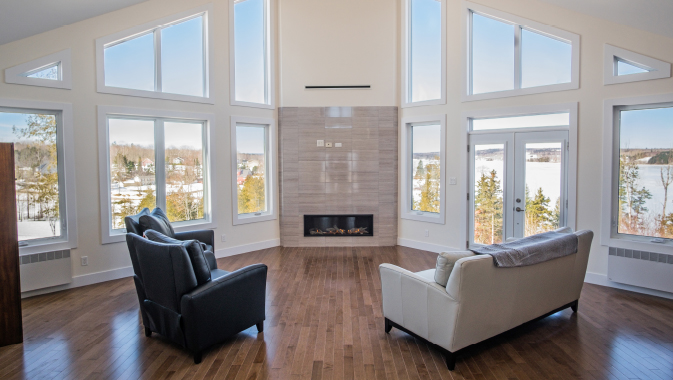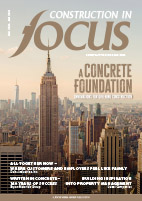Think an 18-foot cathedral ceiling or a luxury ensuite with a fireplace is incompatible with a modular factory-built home? Think again. Supreme Homes, based in Tracadie-Sheila, New Brunswick, with a corporate office in Dieppe and a network of 15 independent retailers in eastern Canada, offers those customized options plus a whole lot more.
~
‘Started small — dreamed big’ could well be a motto for Supreme Homes. In 1983, Aristide Savoie’s construction business started small, building baby barns and sheds. Some years later, his son, Robert Savoie, joined him in the business and they started expand by building homes on site.
Aristide and Robert thought there must be a better way to do things, one where you don’t have to face the weather and deal with the inefficiency of working all over the place, so they decided to build a plant in Tracadie. Their first factory-built home was completed in 1996.
Supreme Homes continued its growth with expansion to the plant in 2000, 2005 and 2010. Robert is now CEO and Aristide is not involved in the day to day, but continues to be very active with his own projects. The third generation began to work in the summertime.
Customized dream homes
So, what could a potential home buyer hope to find in a Supreme Home? It seems the sky’s the limit, literally. “If someone wants to do something unique like a solarium or a studio, we can do that, in fact we’ve done that and more,” Steven Léger, the company’s Director of Sales & Marketing, says. “We don’t limit our clients to our own plans – although we do have those – and we try to stay on the forefront of new designs, but there are no limitations. We’ve even built a home with an 18-foot cathedral ceiling in an arched portion of the living room. We’re limited to 12 feet when transporting the structure on the highway from the plant to the homesite, so we brought the whole roof section separately, added the trusses on site and you’d never think it was a modular home.”
While the standard exterior finish is vinyl siding, clients who want to add stone, shakes, wood or aluminum siding can have that. As Léger likes to say, “Whatever the customer wants, we’ll do.” While some customers want a contemporary style with an open concept living area, others want something that harkens back to the late-Victorian area, with peaked gable windows and a wrap-around veranda, or perhaps a high-end cottage with windows framing an ocean view.
Alternatively, clients can choose from one of the company’s plans. One of the newest, for example, is the Sauvignon — a 1554 square foot three-bedroom home, with two baths and two walk-in closets, open concept living area with large kitchen, walk-in pantry, and attached garage. The multi-plane façade features an attractive mix of stone and vinyl siding, a recessed entry and architecturally interesting gable roofs. But even that plan can be customized to fit exact needs. As well, many models are offered in different architectural styles, with not a cookie-cutter among them. “It’s our willingness to customize that sets us apart from the competition,” Léger says.
To date, over 2000 energy-efficient, durable and attractive homes have been built to code by 150 employees in the 72,000 square foot climate-controlled factory in Tracadie-Sheila. They’ve then been transported across New Brunswick, Nova Scotia, Prince Edward Island and Newfoundland on Canada’s east coast and to neighbouring Quebec, where local subcontractors prepare the foundation and basement and where homeowners testify as to their satisfaction.
Michele Tabor and Stephen Biddington, for example, are first-time homebuyers who refer to the process as “stress-free.” “It was the easiest decision we ever made in our lives,” says Tabor, “and buying a home is a big deal.” “Everything was so easy,” her partner agrees, “and we don’t have any problems, none at all.”
Retail opportunities
The company’s location in northern New Brunswick places it just a hop, skip and jump away from markets in Quebec where there are already four independent Supreme Homes retailers, and from potential markets in the New England states. That’s something Léger says the company is actively looking at as those are areas where modular homes have caught on. While they account for only 20 percent of new builds in Atlantic Canada, they account for 35 to 40 percent in Quebec and Ontario and over 40 percent of market share in the U.S. Modular homes are even more popular in Europe where they account for 80 percent of new homes and are surely the way of the future.
The company makes it a priority to support its employees’ career development and promote from within. Léger himself started working at Supreme Homes twelve years ago. “It was a summer job and I had a broom in my hand, but I was so in love with construction that I wanted to make a career out of it. Initially I thought I would focus more on the carpentry side so that’s what I concentrated on. I worked in the factory at pretty much every stage of construction and when there was an opportunity for leadership roles, I took them as supervisor, production manager. Then three years ago I moved from production and operations to sales and marketing.”
This also meant a move from Tracadie-Sheila to Dieppe in the south-east corner of the province, where the company has a corporate office located near the Greater Moncton International Airport and from whence the team liaises with twenty independent retailers that extend from Deer Lake, Newfoundland to the most recently added one in Val d’Or, Quebec.
Sales and marketing for the sales team and retailers means spending a considerable amount of time – up to 25 hours or perhaps more – with a client, going over every aspect of the home before work begins at the plant. Everything is discussed, from the architectural plan and the exterior and interior finishes, right down to “the electrical outlets. Do you want three-way switches or dimmers on your pot-lights? Everything gets looked at before you sign on the dotted line,” he explains.
Although the company sells on value, not on price, he indicates the cost would fall in the middle range of the home construction industry. “Our goal is not to build the cheapest home out there, and so we don’t tell people to buy a modular home because they’ll have a cheaper home, but a guaranteed fixed price is offered and that’s where savings can be realized,” he says.
“The national average for a stick-built home in Canada is 20 percent over budget. It’s not because contractors try to dupe clients, but they can’t predict weather events that cause delays and cost money. Also, with traditional construction, the interior finishes, the cabinetry, the flooring – none of that is chosen until after the home is built. So a contractor might quote for hardwood flooring at $4 per square foot, but then the client changes his mind and wants to upgrade to $8 per square foot and is adamant that’s what he wants, so the price goes up and he goes back to the bank,” says Léger.
“The advantage we offer is that we’re able to quote a fixed price, because we control our environment. We know what the costs are, we know there’ll be no rain, wind or snow or weather damage to affect the quality, and when the home is placed on the site it will be a turnkey product.”
Becoming an independent retailer with Supreme Homes represents a significant business opportunity. “We’re looking to have sustained growth with the right partners, but the retailers have to be on board with our vision. We’re the manufacturer, but if the retailer isn’t prepared to do his part and share our vision, it won’t work. We want to make sure the people we’re doing business with are construction people, not salespeople who are used to selling anything from cars to RVs or simple cookie-cutter homes with no added value. That’s not what we offer and the people selling our homes must know that and be prepared to work with our clients,” says Léger.
“Some of our largest retailers are in fact contractors who are tired of working in the rain and cold. They’ve done good work as general contractors and they have a good name locally, but they see modular homes as the way of the future and they appreciate that we’re building the same quality of homes in the factory as they would have built on site.”
Another key component involves forming relationships with reliable, brand-name suppliers who guarantee their prices and ability to get products delivered on time, products which include everything from doors and windows to kitchen cabinets and bathroom fixtures right down to the light switches. For Supreme Homes to stand by its word of offering a turnkey home, every detail must be in place before it leaves the factory.
Looking ahead
As Supreme Homes continues to grow, it’s also branching out. With the flexibility to complete all types of projects, the firm recently completed the four-story Marriott Fairfield Inn in Moncton with the second, third and fourth stories completed in 39 sections in the plant. Because the first-floor required steel structure with a swimming pool and a restaurant it was built on site by a local subcontractor.
From baby barns to over 2000 customized dream homes and a hotel, Supreme Homes keeps building on its strengths and receiving significant recognition for its work. The company was honoured in 2010 with the Economic Council of New Brunswick’s Business of the Year Award and was a finalist in the 2011 Ernst & Young Award for Atlantic Canada. As the firm moves forward, the sky really is the limit.






